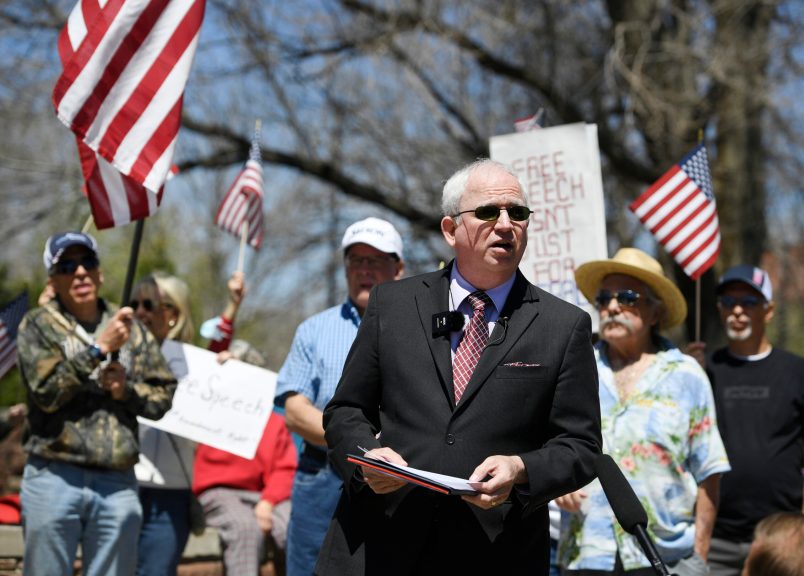The California State Bar responded to Trump coup attorney John Eastman’s request to postpone disbarment proceedings against him, arguing that special counsel Jack Smith’s latest indictment of Donald Trump is not a good enough reason to delay the license trial.
Bar authorities in California also accused Eastman of hypocrisy in his requests to delay proceedings, citing Eastman’s recent, revelatory series of interviews with Tom Klingenstein, the Chairman of the Trumpite Claremont Institute.
While unnamed, Eastman has been identified as uncharged “co-conspirator 2” in Smith’s recent indictment of Trump as part of his investigation into the 2020 election and Trump’s efforts to overturn it. Eastman, an attorney and Trump ally, was a key player in the plots to delay the certification of the election, constructing the legal rationale for doing so alongside another attorney with whom he had worked in the past, Ken Chesebro.
The California State Bar brought 11 professional charges against Eastman for alleged violations of professional rules and ethics as part of his plot to pressure Vice President Mike Pence into not certifying the 2020 election. They argued his lies about voter fraud and his efforts to push an “unlawful” scheme to overturn the election should disqualify him from remaining a licensed attorney in California.
His disbarment trial began in June, but was delayed until later this month after witnesses, including former attorney for Pence Greg Jacob, testified against Eastman. Last week the Trump ally asked if bar authorities would postpone the trial out of concerns that he will soon be charged by special counsel Smith. His lawyers argued that if he were indicted, Eastman would have to assert the Fifth Amendment in future disbarment proceedings.
“The indictment heightens the potential for [Eastman] to be charged as a criminal defendant,” Eastman’s attorneys wrote last week. “When there are parallel criminal and civil proceedings, the defendant faces the difficult choice of asserting his Fifth Amendment right at the risk of losing a non-criminal trial (here, a disciplinary proceeding), or waiving his constitutional right against self-incrimination. Courts have recognized the need to stay civil proceedings to avoid prejudicing the defendant’s rights.”
Pointing to recent interviews that Eastman has given — including one in which Eastman reiterated and justified the legal arguments he made around Jan. 6 and made a broader rhetorical argument about the need to overthrow governments — the California State Bar argued to the disciplinary judge in a new 17-page filing just how much they are not buying Eastman’s assertion that Smith’s probe changes things.
“Needless to say, during these interviews, respondent never asserted the Fifth Amendment,” Duncan Carling, the attorney leading the disbarment proceedings, wrote after outlining Eastman’s recent remarks, in which he continues to assert the 2020 election was stolen.
“Respondent’s public statements while the State Bar case has been pending are
relevant for two reasons. First, respondent’s willingness to speak at length in public about
his conduct, when he knows he faces possible criminal charges related to this conduct,
indicates that he is not concerned about incriminating himself by speaking about these
topics, and his motion for abatement is intended solely to delay the proceedings,” Carling continued. “Second, respondent’s continuing misrepresentations regarding voter fraud and a “stolen” election indicate that the public interest would be served by timely resolution of his State Bar disciplinary case.”
Calling Eastman’s rationale for requesting to delay disbarment proceedings “opportunistic,” Carling argued that Eastman is not naive to his criminal exposure and has been aware of it for years as he asserted his Fifth Amendment rights when he appeared for testimony before the House Jan. 6 Select Committee and in meeting with Fulton County prosecutors.
“Now, having heard six days of evidence against him, including testimony from Greg Jacob, Dr. Justin Grimmer, and four state election officials, and after being confronted with evidence demonstrating the absence of support for his frivolous and false claims of fraud and a stolen election, respondent seeks to use the Trump indictment as an excuse to delay
the rest of his trial,” Carling wrote. “This is nothing more than an opportunistic attempt to delay the decision in respondent’s State Bar case, as his situation with regard to potential criminal charges is the same today as when the trial started.”



